CNA688: Ethical Implications & Mitigation in Clinical Research
VerifiedAdded on 2023/06/03
|8
|1799
|53
Report
AI Summary
This report provides an in-depth analysis of ethical considerations in healthcare research, particularly focusing on a scenario involving patients with and without dementia undergoing orthopedic surgery. It identifies key ethical principles such as respect for human beings, justice, beneficence, and integrity, and discusses their relevance in research settings. The report also explores mitigation strategies to address ethical concerns when conducting research with vulnerable populations, emphasizing the importance of informed consent, confidentiality, and minimizing potential harm. Furthermore, it highlights the significance of adhering to established ethical guidelines and regulations to ensure the well-being and rights of research participants. Desklib offers a platform to access this and other solved assignments for students.
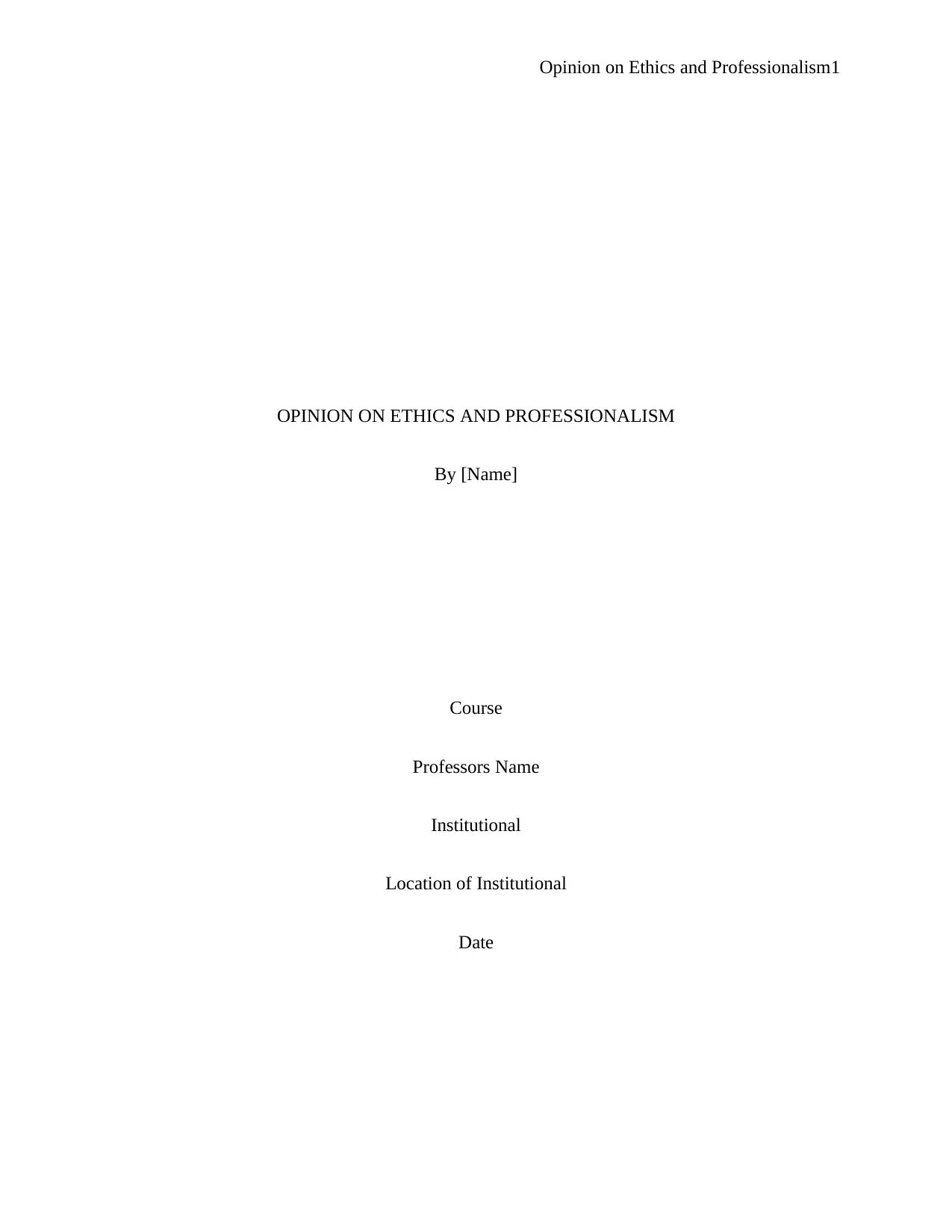
Opinion on Ethics and Professionalism1
OPINION ON ETHICS AND PROFESSIONALISM
By [Name]
Course
Professors Name
Institutional
Location of Institutional
Date
OPINION ON ETHICS AND PROFESSIONALISM
By [Name]
Course
Professors Name
Institutional
Location of Institutional
Date
Paraphrase This Document
Need a fresh take? Get an instant paraphrase of this document with our AI Paraphraser
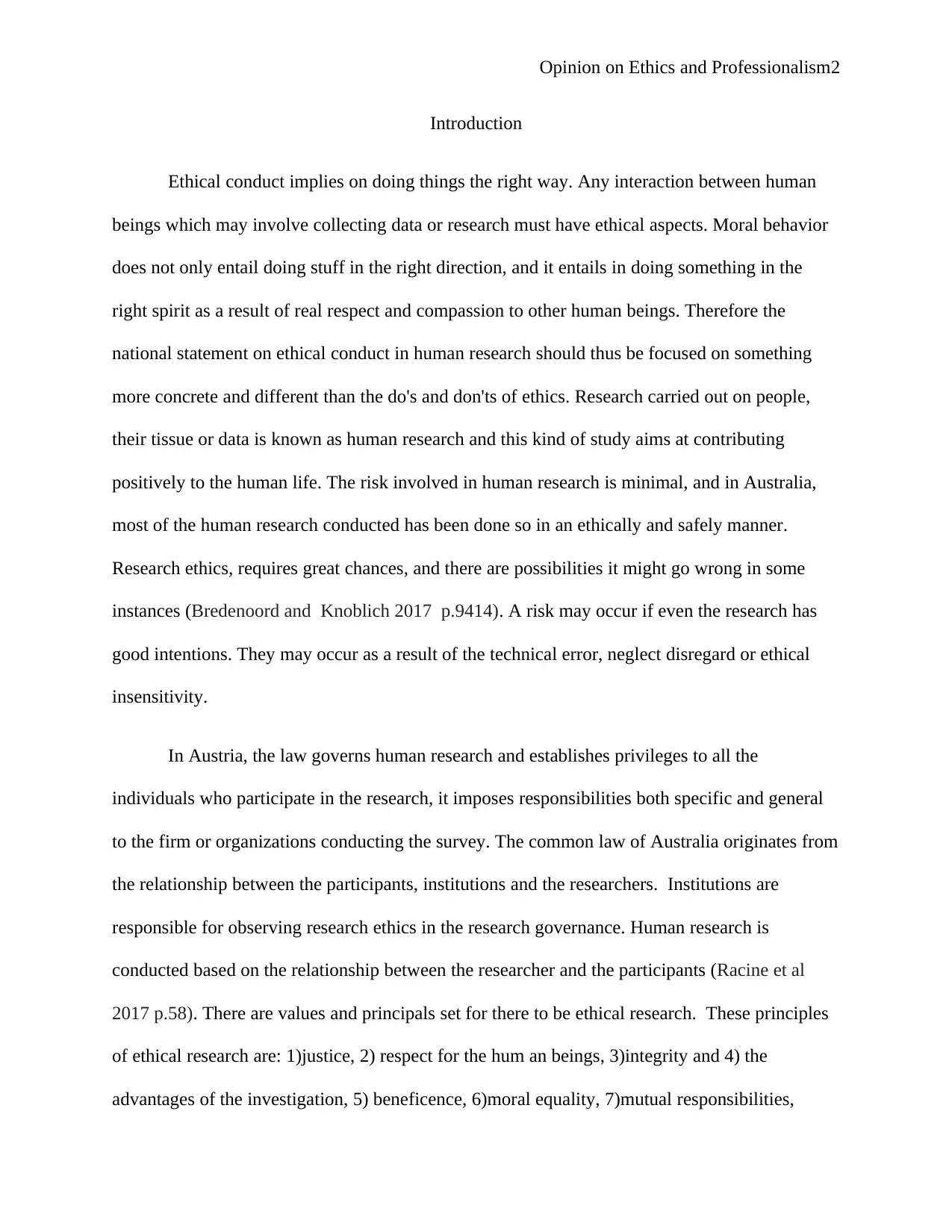
Opinion on Ethics and Professionalism2
Introduction
Ethical conduct implies on doing things the right way. Any interaction between human
beings which may involve collecting data or research must have ethical aspects. Moral behavior
does not only entail doing stuff in the right direction, and it entails in doing something in the
right spirit as a result of real respect and compassion to other human beings. Therefore the
national statement on ethical conduct in human research should thus be focused on something
more concrete and different than the do's and don'ts of ethics. Research carried out on people,
their tissue or data is known as human research and this kind of study aims at contributing
positively to the human life. The risk involved in human research is minimal, and in Australia,
most of the human research conducted has been done so in an ethically and safely manner.
Research ethics, requires great chances, and there are possibilities it might go wrong in some
instances (Bredenoord and Knoblich 2017 p.9414). A risk may occur if even the research has
good intentions. They may occur as a result of the technical error, neglect disregard or ethical
insensitivity.
In Austria, the law governs human research and establishes privileges to all the
individuals who participate in the research, it imposes responsibilities both specific and general
to the firm or organizations conducting the survey. The common law of Australia originates from
the relationship between the participants, institutions and the researchers. Institutions are
responsible for observing research ethics in the research governance. Human research is
conducted based on the relationship between the researcher and the participants (Racine et al
2017 p.58). There are values and principals set for there to be ethical research. These principles
of ethical research are: 1)justice, 2) respect for the hum an beings, 3)integrity and 4) the
advantages of the investigation, 5) beneficence, 6)moral equality, 7)mutual responsibilities,
Introduction
Ethical conduct implies on doing things the right way. Any interaction between human
beings which may involve collecting data or research must have ethical aspects. Moral behavior
does not only entail doing stuff in the right direction, and it entails in doing something in the
right spirit as a result of real respect and compassion to other human beings. Therefore the
national statement on ethical conduct in human research should thus be focused on something
more concrete and different than the do's and don'ts of ethics. Research carried out on people,
their tissue or data is known as human research and this kind of study aims at contributing
positively to the human life. The risk involved in human research is minimal, and in Australia,
most of the human research conducted has been done so in an ethically and safely manner.
Research ethics, requires great chances, and there are possibilities it might go wrong in some
instances (Bredenoord and Knoblich 2017 p.9414). A risk may occur if even the research has
good intentions. They may occur as a result of the technical error, neglect disregard or ethical
insensitivity.
In Austria, the law governs human research and establishes privileges to all the
individuals who participate in the research, it imposes responsibilities both specific and general
to the firm or organizations conducting the survey. The common law of Australia originates from
the relationship between the participants, institutions and the researchers. Institutions are
responsible for observing research ethics in the research governance. Human research is
conducted based on the relationship between the researcher and the participants (Racine et al
2017 p.58). There are values and principals set for there to be ethical research. These principles
of ethical research are: 1)justice, 2) respect for the hum an beings, 3)integrity and 4) the
advantages of the investigation, 5) beneficence, 6)moral equality, 7)mutual responsibilities,
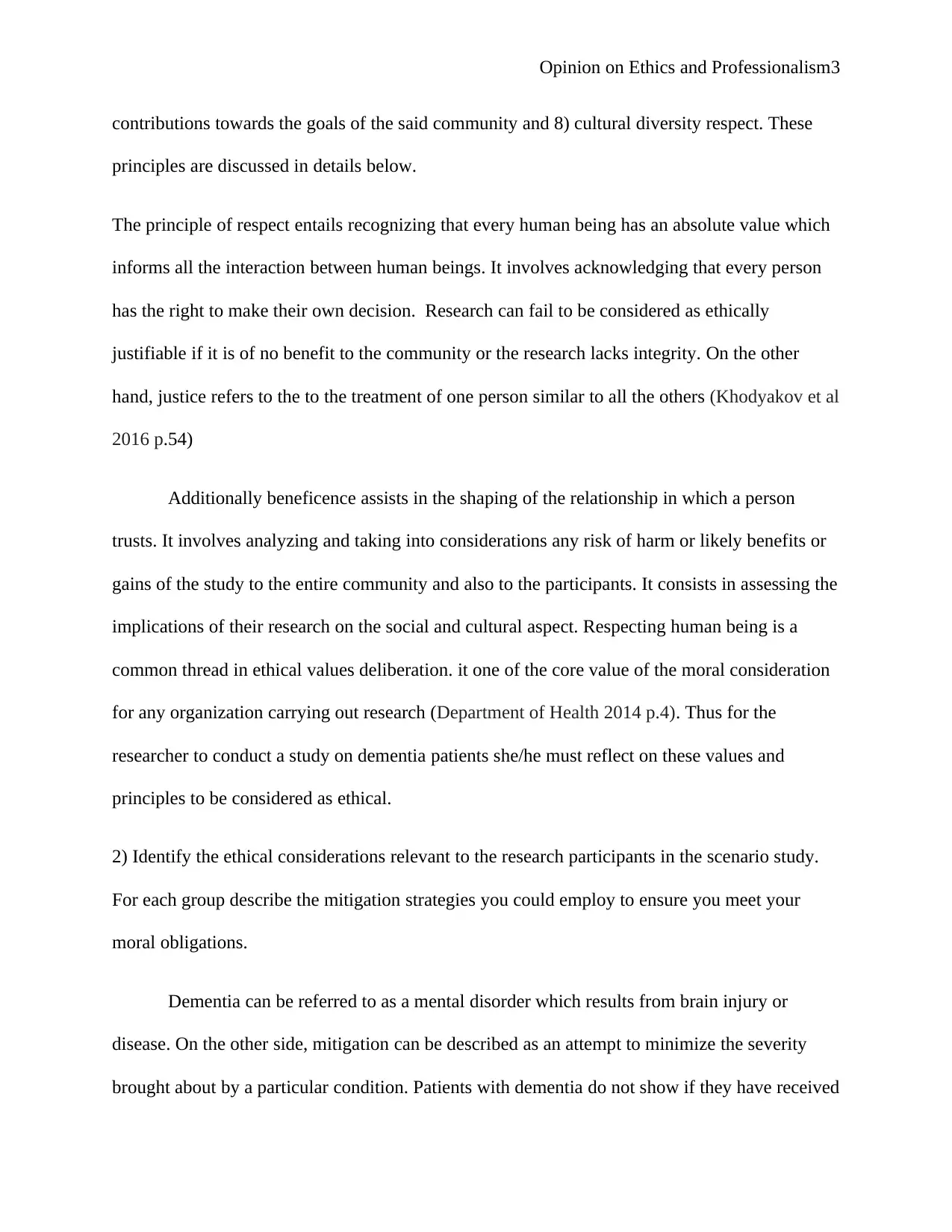
Opinion on Ethics and Professionalism3
contributions towards the goals of the said community and 8) cultural diversity respect. These
principles are discussed in details below.
The principle of respect entails recognizing that every human being has an absolute value which
informs all the interaction between human beings. It involves acknowledging that every person
has the right to make their own decision. Research can fail to be considered as ethically
justifiable if it is of no benefit to the community or the research lacks integrity. On the other
hand, justice refers to the to the treatment of one person similar to all the others (Khodyakov et al
2016 p.54)
Additionally beneficence assists in the shaping of the relationship in which a person
trusts. It involves analyzing and taking into considerations any risk of harm or likely benefits or
gains of the study to the entire community and also to the participants. It consists in assessing the
implications of their research on the social and cultural aspect. Respecting human being is a
common thread in ethical values deliberation. it one of the core value of the moral consideration
for any organization carrying out research (Department of Health 2014 p.4). Thus for the
researcher to conduct a study on dementia patients she/he must reflect on these values and
principles to be considered as ethical.
2) Identify the ethical considerations relevant to the research participants in the scenario study.
For each group describe the mitigation strategies you could employ to ensure you meet your
moral obligations.
Dementia can be referred to as a mental disorder which results from brain injury or
disease. On the other side, mitigation can be described as an attempt to minimize the severity
brought about by a particular condition. Patients with dementia do not show if they have received
contributions towards the goals of the said community and 8) cultural diversity respect. These
principles are discussed in details below.
The principle of respect entails recognizing that every human being has an absolute value which
informs all the interaction between human beings. It involves acknowledging that every person
has the right to make their own decision. Research can fail to be considered as ethically
justifiable if it is of no benefit to the community or the research lacks integrity. On the other
hand, justice refers to the to the treatment of one person similar to all the others (Khodyakov et al
2016 p.54)
Additionally beneficence assists in the shaping of the relationship in which a person
trusts. It involves analyzing and taking into considerations any risk of harm or likely benefits or
gains of the study to the entire community and also to the participants. It consists in assessing the
implications of their research on the social and cultural aspect. Respecting human being is a
common thread in ethical values deliberation. it one of the core value of the moral consideration
for any organization carrying out research (Department of Health 2014 p.4). Thus for the
researcher to conduct a study on dementia patients she/he must reflect on these values and
principles to be considered as ethical.
2) Identify the ethical considerations relevant to the research participants in the scenario study.
For each group describe the mitigation strategies you could employ to ensure you meet your
moral obligations.
Dementia can be referred to as a mental disorder which results from brain injury or
disease. On the other side, mitigation can be described as an attempt to minimize the severity
brought about by a particular condition. Patients with dementia do not show if they have received
⊘ This is a preview!⊘
Do you want full access?
Subscribe today to unlock all pages.

Trusted by 1+ million students worldwide
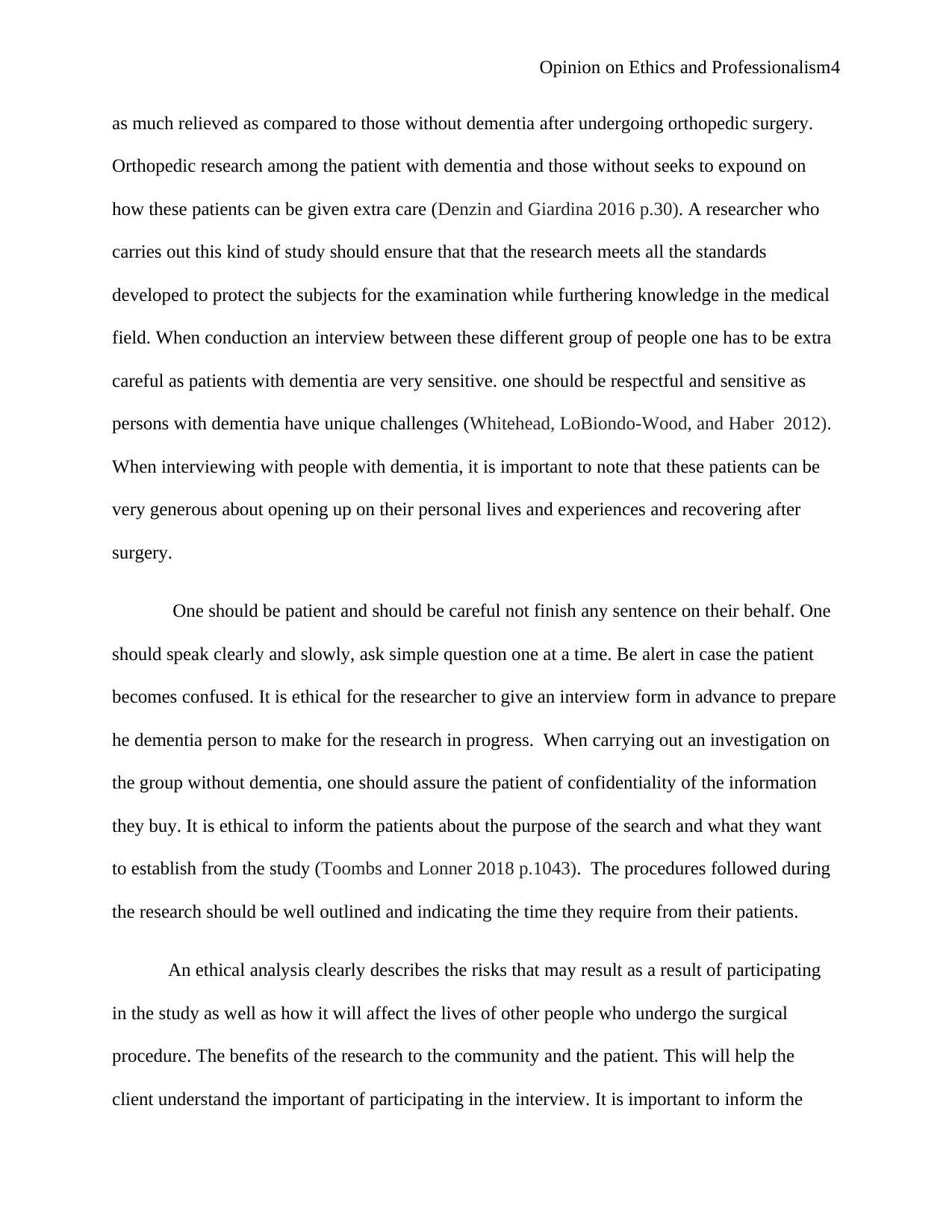
Opinion on Ethics and Professionalism4
as much relieved as compared to those without dementia after undergoing orthopedic surgery.
Orthopedic research among the patient with dementia and those without seeks to expound on
how these patients can be given extra care (Denzin and Giardina 2016 p.30). A researcher who
carries out this kind of study should ensure that that the research meets all the standards
developed to protect the subjects for the examination while furthering knowledge in the medical
field. When conduction an interview between these different group of people one has to be extra
careful as patients with dementia are very sensitive. one should be respectful and sensitive as
persons with dementia have unique challenges (Whitehead, LoBiondo-Wood, and Haber 2012).
When interviewing with people with dementia, it is important to note that these patients can be
very generous about opening up on their personal lives and experiences and recovering after
surgery.
One should be patient and should be careful not finish any sentence on their behalf. One
should speak clearly and slowly, ask simple question one at a time. Be alert in case the patient
becomes confused. It is ethical for the researcher to give an interview form in advance to prepare
he dementia person to make for the research in progress. When carrying out an investigation on
the group without dementia, one should assure the patient of confidentiality of the information
they buy. It is ethical to inform the patients about the purpose of the search and what they want
to establish from the study (Toombs and Lonner 2018 p.1043). The procedures followed during
the research should be well outlined and indicating the time they require from their patients.
An ethical analysis clearly describes the risks that may result as a result of participating
in the study as well as how it will affect the lives of other people who undergo the surgical
procedure. The benefits of the research to the community and the patient. This will help the
client understand the important of participating in the interview. It is important to inform the
as much relieved as compared to those without dementia after undergoing orthopedic surgery.
Orthopedic research among the patient with dementia and those without seeks to expound on
how these patients can be given extra care (Denzin and Giardina 2016 p.30). A researcher who
carries out this kind of study should ensure that that the research meets all the standards
developed to protect the subjects for the examination while furthering knowledge in the medical
field. When conduction an interview between these different group of people one has to be extra
careful as patients with dementia are very sensitive. one should be respectful and sensitive as
persons with dementia have unique challenges (Whitehead, LoBiondo-Wood, and Haber 2012).
When interviewing with people with dementia, it is important to note that these patients can be
very generous about opening up on their personal lives and experiences and recovering after
surgery.
One should be patient and should be careful not finish any sentence on their behalf. One
should speak clearly and slowly, ask simple question one at a time. Be alert in case the patient
becomes confused. It is ethical for the researcher to give an interview form in advance to prepare
he dementia person to make for the research in progress. When carrying out an investigation on
the group without dementia, one should assure the patient of confidentiality of the information
they buy. It is ethical to inform the patients about the purpose of the search and what they want
to establish from the study (Toombs and Lonner 2018 p.1043). The procedures followed during
the research should be well outlined and indicating the time they require from their patients.
An ethical analysis clearly describes the risks that may result as a result of participating
in the study as well as how it will affect the lives of other people who undergo the surgical
procedure. The benefits of the research to the community and the patient. This will help the
client understand the important of participating in the interview. It is important to inform the
Paraphrase This Document
Need a fresh take? Get an instant paraphrase of this document with our AI Paraphraser

Opinion on Ethics and Professionalism5
participants that agreeing to be part of the study is optional and voluntary. The researcher should
assure the interviewee of confidentiality and that the information they provide will be secured
and will only be used for that study only (Daley et al 2016 p.735) Most people refuse to
participate in research as they fear the information they have been given may be used for other
purposes rather than the one mentioned.
In conclusion, any researcher who may want to research the medical field should observe
all the above ethical rules that have been developed by recognized institutions and use the results
to improve on human lives.
participants that agreeing to be part of the study is optional and voluntary. The researcher should
assure the interviewee of confidentiality and that the information they provide will be secured
and will only be used for that study only (Daley et al 2016 p.735) Most people refuse to
participate in research as they fear the information they have been given may be used for other
purposes rather than the one mentioned.
In conclusion, any researcher who may want to research the medical field should observe
all the above ethical rules that have been developed by recognized institutions and use the results
to improve on human lives.
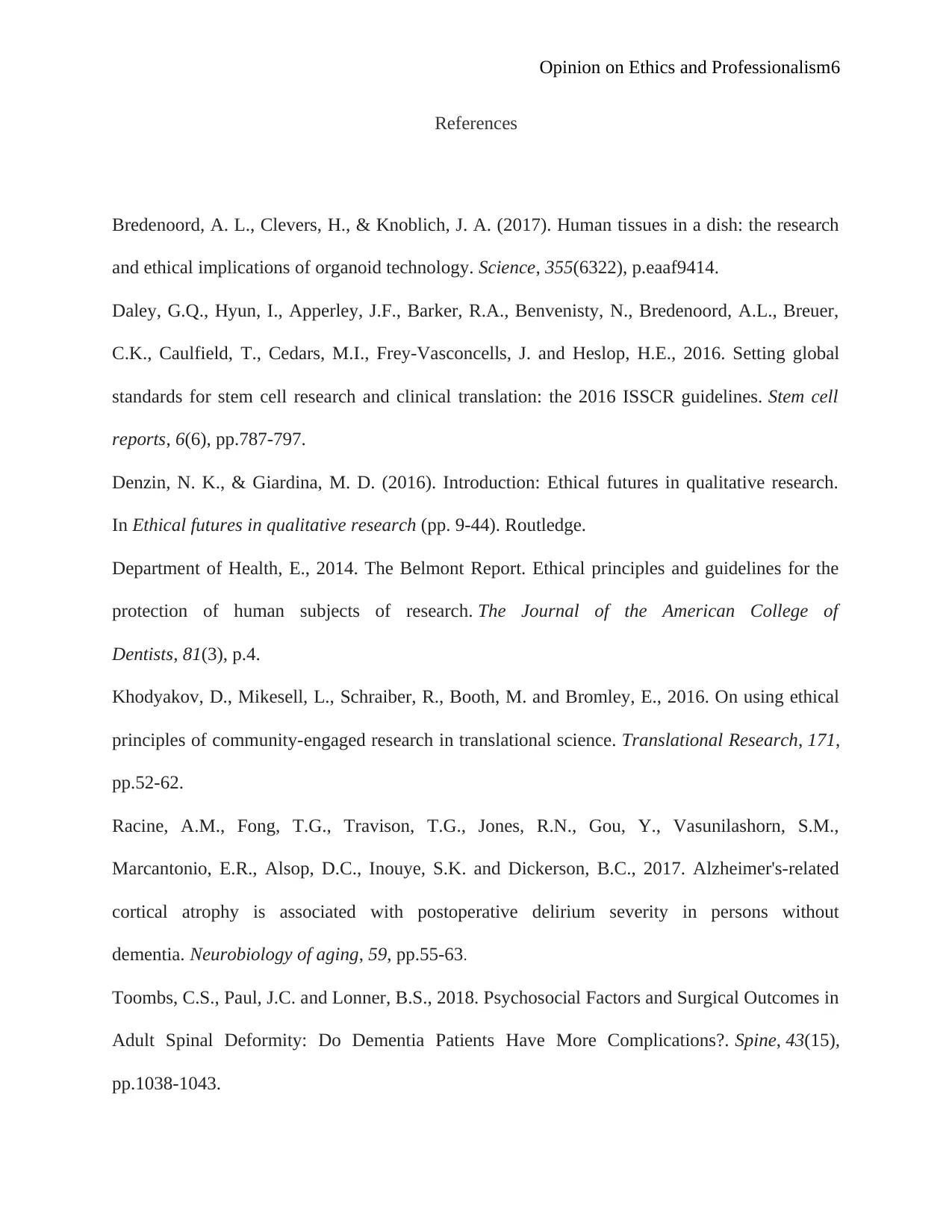
Opinion on Ethics and Professionalism6
References
Bredenoord, A. L., Clevers, H., & Knoblich, J. A. (2017). Human tissues in a dish: the research
and ethical implications of organoid technology. Science, 355(6322), p.eaaf9414.
Daley, G.Q., Hyun, I., Apperley, J.F., Barker, R.A., Benvenisty, N., Bredenoord, A.L., Breuer,
C.K., Caulfield, T., Cedars, M.I., Frey-Vasconcells, J. and Heslop, H.E., 2016. Setting global
standards for stem cell research and clinical translation: the 2016 ISSCR guidelines. Stem cell
reports, 6(6), pp.787-797.
Denzin, N. K., & Giardina, M. D. (2016). Introduction: Ethical futures in qualitative research.
In Ethical futures in qualitative research (pp. 9-44). Routledge.
Department of Health, E., 2014. The Belmont Report. Ethical principles and guidelines for the
protection of human subjects of research. The Journal of the American College of
Dentists, 81(3), p.4.
Khodyakov, D., Mikesell, L., Schraiber, R., Booth, M. and Bromley, E., 2016. On using ethical
principles of community-engaged research in translational science. Translational Research, 171,
pp.52-62.
Racine, A.M., Fong, T.G., Travison, T.G., Jones, R.N., Gou, Y., Vasunilashorn, S.M.,
Marcantonio, E.R., Alsop, D.C., Inouye, S.K. and Dickerson, B.C., 2017. Alzheimer's-related
cortical atrophy is associated with postoperative delirium severity in persons without
dementia. Neurobiology of aging, 59, pp.55-63.
Toombs, C.S., Paul, J.C. and Lonner, B.S., 2018. Psychosocial Factors and Surgical Outcomes in
Adult Spinal Deformity: Do Dementia Patients Have More Complications?. Spine, 43(15),
pp.1038-1043.
References
Bredenoord, A. L., Clevers, H., & Knoblich, J. A. (2017). Human tissues in a dish: the research
and ethical implications of organoid technology. Science, 355(6322), p.eaaf9414.
Daley, G.Q., Hyun, I., Apperley, J.F., Barker, R.A., Benvenisty, N., Bredenoord, A.L., Breuer,
C.K., Caulfield, T., Cedars, M.I., Frey-Vasconcells, J. and Heslop, H.E., 2016. Setting global
standards for stem cell research and clinical translation: the 2016 ISSCR guidelines. Stem cell
reports, 6(6), pp.787-797.
Denzin, N. K., & Giardina, M. D. (2016). Introduction: Ethical futures in qualitative research.
In Ethical futures in qualitative research (pp. 9-44). Routledge.
Department of Health, E., 2014. The Belmont Report. Ethical principles and guidelines for the
protection of human subjects of research. The Journal of the American College of
Dentists, 81(3), p.4.
Khodyakov, D., Mikesell, L., Schraiber, R., Booth, M. and Bromley, E., 2016. On using ethical
principles of community-engaged research in translational science. Translational Research, 171,
pp.52-62.
Racine, A.M., Fong, T.G., Travison, T.G., Jones, R.N., Gou, Y., Vasunilashorn, S.M.,
Marcantonio, E.R., Alsop, D.C., Inouye, S.K. and Dickerson, B.C., 2017. Alzheimer's-related
cortical atrophy is associated with postoperative delirium severity in persons without
dementia. Neurobiology of aging, 59, pp.55-63.
Toombs, C.S., Paul, J.C. and Lonner, B.S., 2018. Psychosocial Factors and Surgical Outcomes in
Adult Spinal Deformity: Do Dementia Patients Have More Complications?. Spine, 43(15),
pp.1038-1043.
⊘ This is a preview!⊘
Do you want full access?
Subscribe today to unlock all pages.

Trusted by 1+ million students worldwide
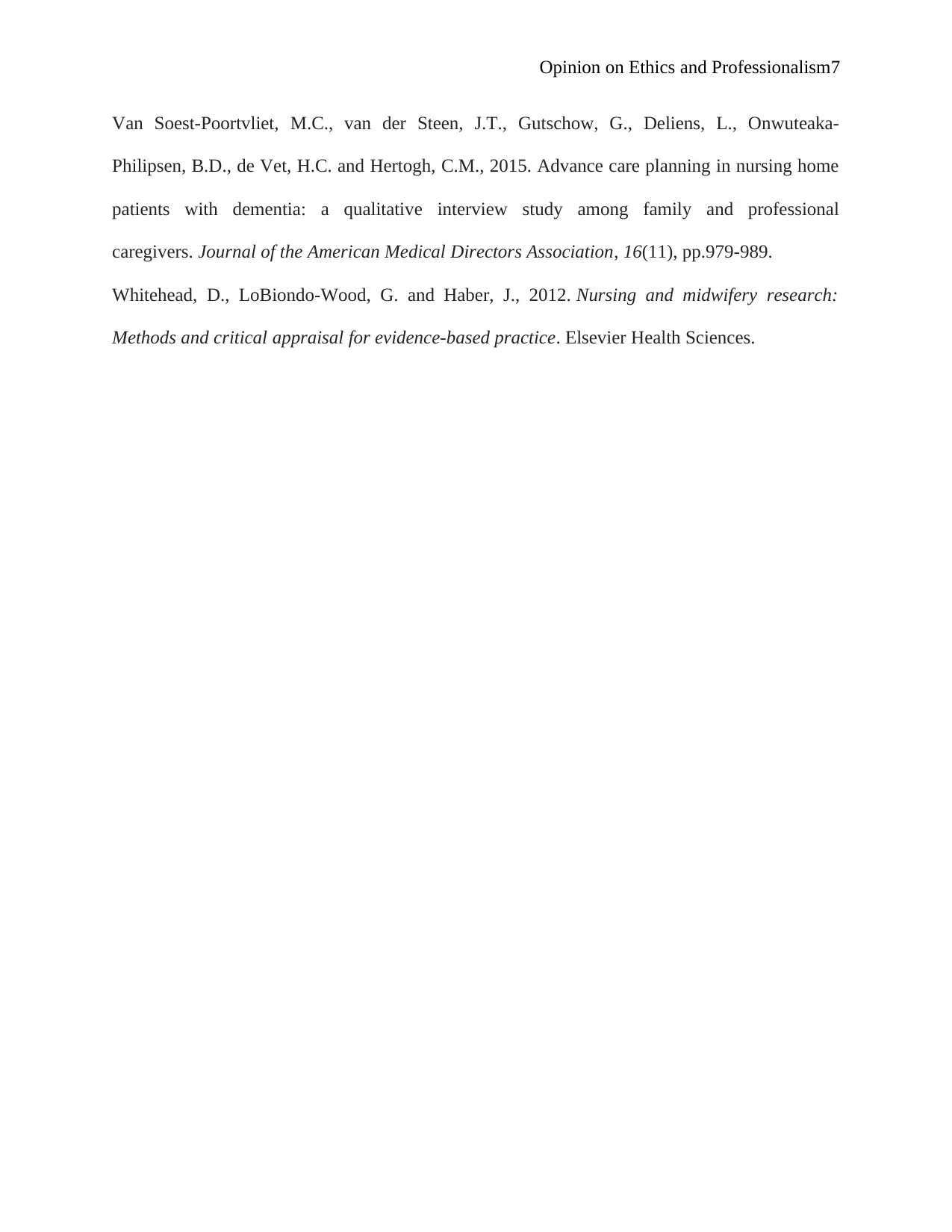
Opinion on Ethics and Professionalism7
Van Soest-Poortvliet, M.C., van der Steen, J.T., Gutschow, G., Deliens, L., Onwuteaka-
Philipsen, B.D., de Vet, H.C. and Hertogh, C.M., 2015. Advance care planning in nursing home
patients with dementia: a qualitative interview study among family and professional
caregivers. Journal of the American Medical Directors Association, 16(11), pp.979-989.
Whitehead, D., LoBiondo-Wood, G. and Haber, J., 2012. Nursing and midwifery research:
Methods and critical appraisal for evidence-based practice. Elsevier Health Sciences.
Van Soest-Poortvliet, M.C., van der Steen, J.T., Gutschow, G., Deliens, L., Onwuteaka-
Philipsen, B.D., de Vet, H.C. and Hertogh, C.M., 2015. Advance care planning in nursing home
patients with dementia: a qualitative interview study among family and professional
caregivers. Journal of the American Medical Directors Association, 16(11), pp.979-989.
Whitehead, D., LoBiondo-Wood, G. and Haber, J., 2012. Nursing and midwifery research:
Methods and critical appraisal for evidence-based practice. Elsevier Health Sciences.
Paraphrase This Document
Need a fresh take? Get an instant paraphrase of this document with our AI Paraphraser
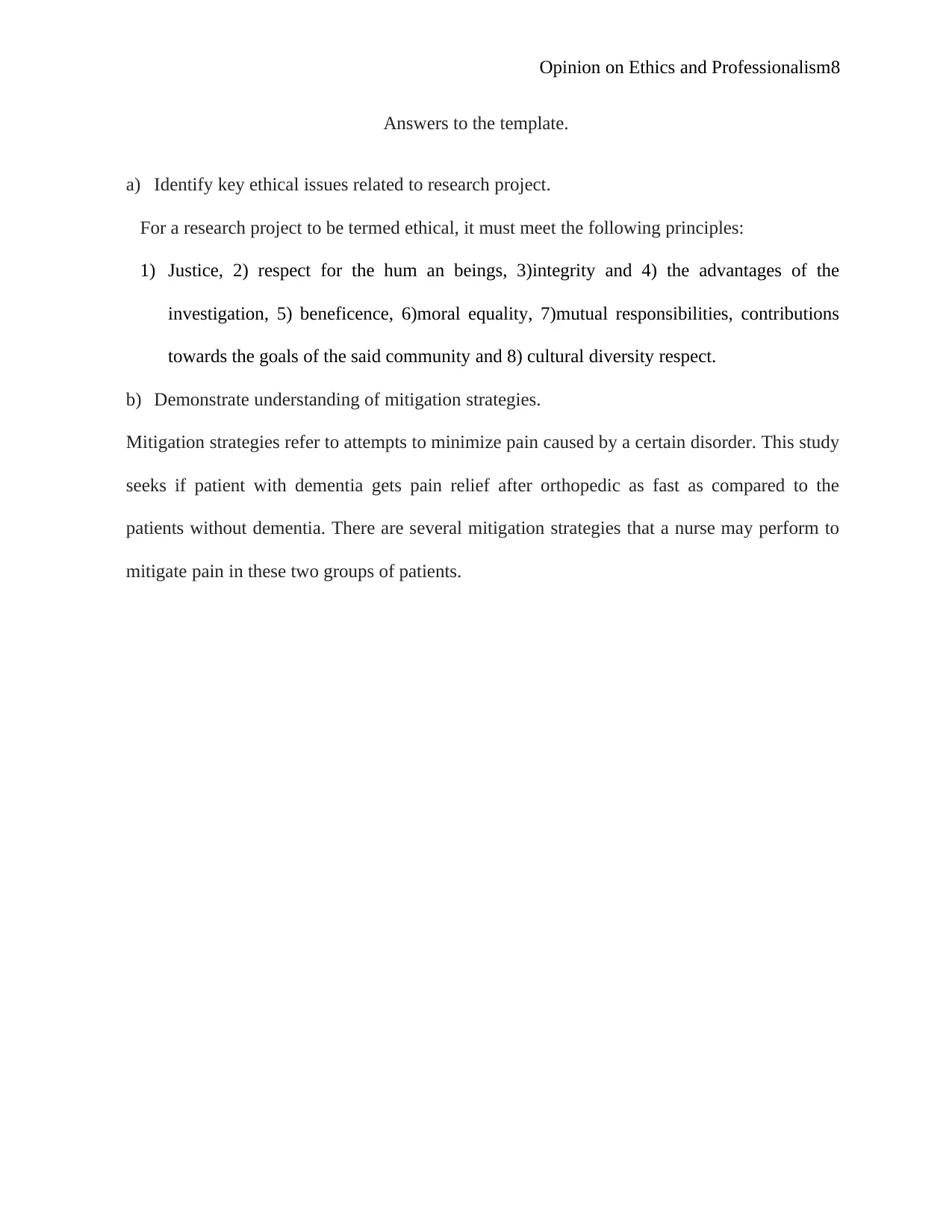
Opinion on Ethics and Professionalism8
Answers to the template.
a) Identify key ethical issues related to research project.
For a research project to be termed ethical, it must meet the following principles:
1) Justice, 2) respect for the hum an beings, 3)integrity and 4) the advantages of the
investigation, 5) beneficence, 6)moral equality, 7)mutual responsibilities, contributions
towards the goals of the said community and 8) cultural diversity respect.
b) Demonstrate understanding of mitigation strategies.
Mitigation strategies refer to attempts to minimize pain caused by a certain disorder. This study
seeks if patient with dementia gets pain relief after orthopedic as fast as compared to the
patients without dementia. There are several mitigation strategies that a nurse may perform to
mitigate pain in these two groups of patients.
Answers to the template.
a) Identify key ethical issues related to research project.
For a research project to be termed ethical, it must meet the following principles:
1) Justice, 2) respect for the hum an beings, 3)integrity and 4) the advantages of the
investigation, 5) beneficence, 6)moral equality, 7)mutual responsibilities, contributions
towards the goals of the said community and 8) cultural diversity respect.
b) Demonstrate understanding of mitigation strategies.
Mitigation strategies refer to attempts to minimize pain caused by a certain disorder. This study
seeks if patient with dementia gets pain relief after orthopedic as fast as compared to the
patients without dementia. There are several mitigation strategies that a nurse may perform to
mitigate pain in these two groups of patients.
1 out of 8
Related Documents
Your All-in-One AI-Powered Toolkit for Academic Success.
+13062052269
info@desklib.com
Available 24*7 on WhatsApp / Email
![[object Object]](/_next/static/media/star-bottom.7253800d.svg)
Unlock your academic potential
Copyright © 2020–2026 A2Z Services. All Rights Reserved. Developed and managed by ZUCOL.





